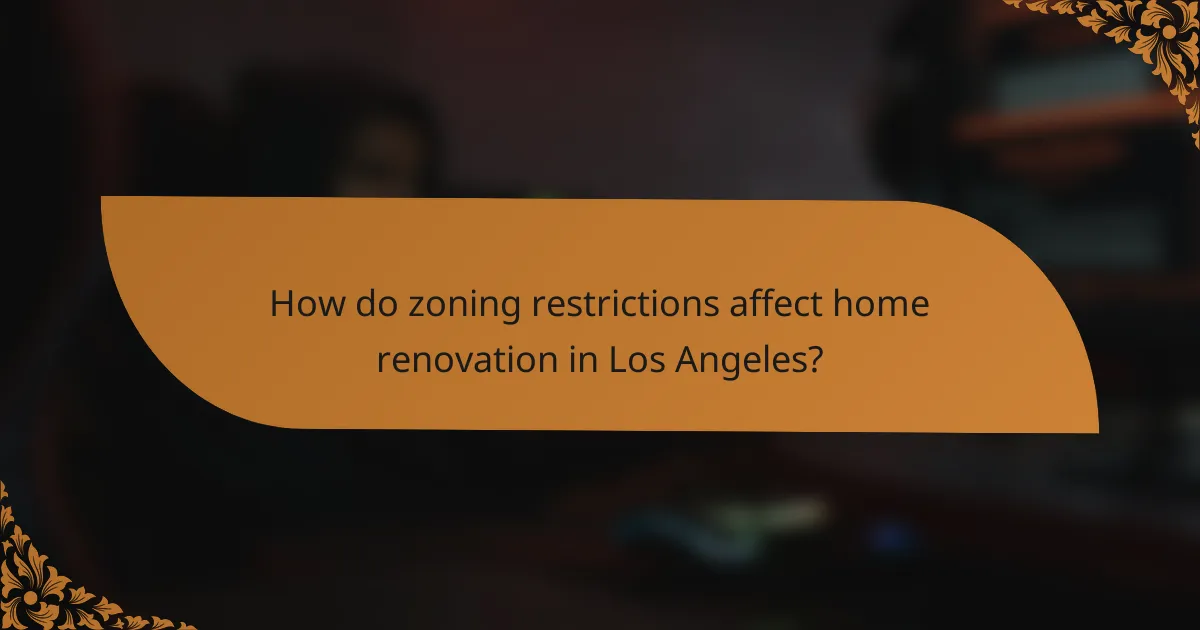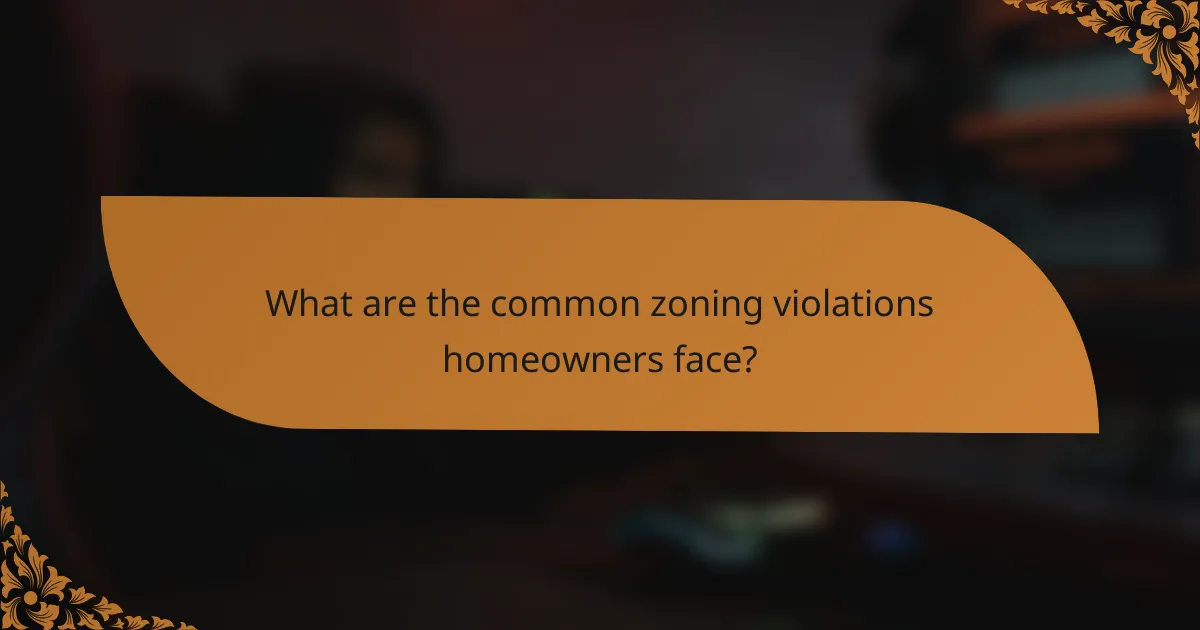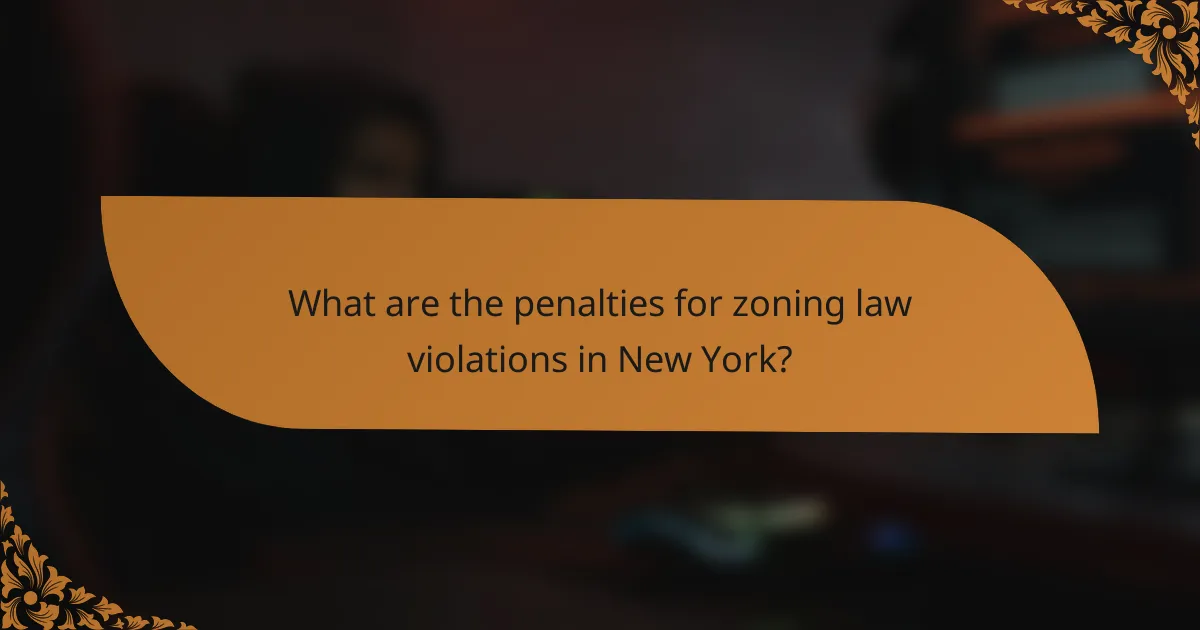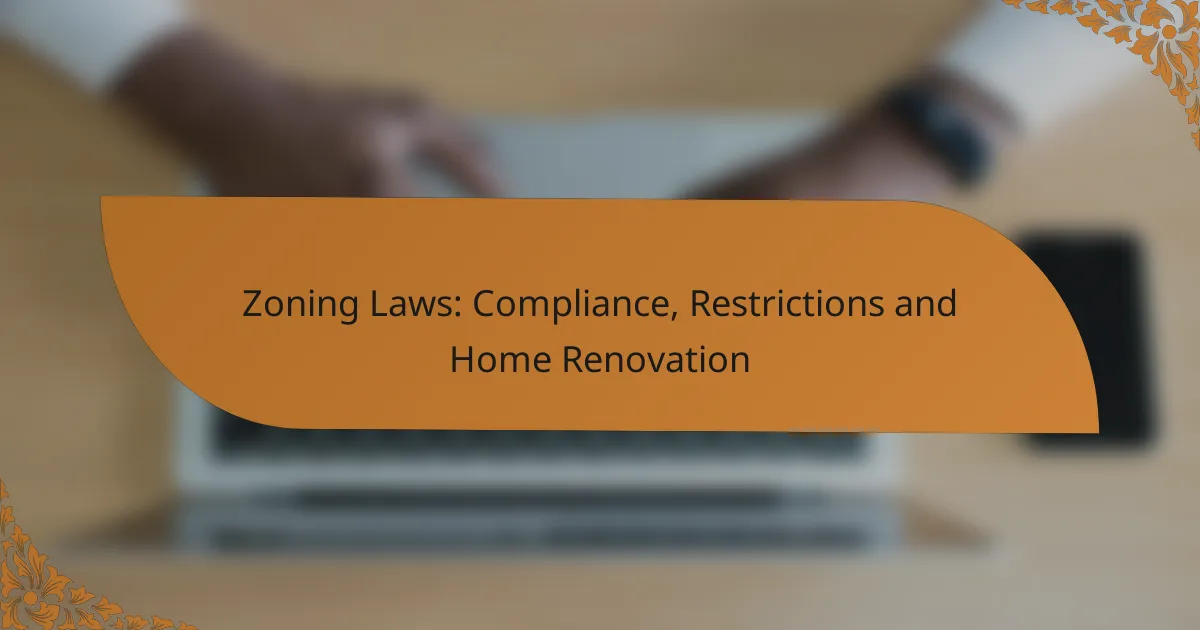Zoning laws play a critical role in home renovation by establishing guidelines for land use, building standards, and property modifications. Homeowners must navigate these regulations to ensure their projects comply with local requirements, particularly in areas like Los Angeles where restrictions can significantly impact design and construction. Awareness of potential zoning violations is essential for avoiding penalties and ensuring that renovations meet community standards.

What are the zoning law compliance requirements in California?
Zoning law compliance in California involves adhering to local regulations that dictate land use, building standards, and property development. Homeowners must ensure their renovations align with these laws to avoid penalties and ensure safety.
Local government regulations
Local governments in California establish zoning regulations that vary by city and county. These regulations outline what types of structures can be built, where they can be located, and how they can be used. Homeowners should consult their local planning department to understand specific zoning codes and any recent updates.
Common restrictions include setbacks, height limits, and density requirements. For example, a residential area may have a maximum building height of 30 feet and require a 10-foot setback from property lines.
Building permit processes
Before starting any renovation project, homeowners in California typically need to obtain a building permit from their local government. This process ensures that the planned work complies with zoning laws and safety standards. Applications usually require detailed plans and may involve fees that vary based on project scope.
It is advisable to submit plans early in the process, as review times can range from a few weeks to several months, depending on the complexity of the project and local workload.
Property use classifications
California zoning laws classify properties into various categories, such as residential, commercial, industrial, and agricultural. Each classification has specific rules regarding permissible activities and structures. For instance, residential zones may restrict commercial activities, while agricultural zones might limit residential development.
Understanding property use classifications is crucial for homeowners planning renovations. If a proposed use does not align with the zoning classification, a zoning variance may be required, which can be a lengthy process involving public hearings and additional fees.

How do zoning restrictions affect home renovation in Los Angeles?
Zoning restrictions in Los Angeles significantly influence home renovation projects by dictating what modifications can be made to properties. These regulations ensure that renovations align with community standards, affecting aspects such as property use, size, and aesthetics.
Setback requirements
Setback requirements dictate how far structures must be from property lines. In Los Angeles, these distances can vary based on the zoning designation, typically ranging from 5 to 20 feet. Homeowners must ensure that any renovations, such as additions or new constructions, comply with these limits to avoid penalties.
To check specific setback requirements for your property, consult the Los Angeles Department of City Planning or use their online zoning information tool. Ignoring these rules can lead to costly fines or the need for expensive redesigns.
Height limitations
Height limitations restrict how tall a building or addition can be, which is crucial in maintaining neighborhood character. In many residential zones in Los Angeles, height restrictions can range from 30 to 45 feet, depending on the area and zoning type.
Before planning a renovation, verify the height restrictions applicable to your property. Exceeding these limits can result in a denial of permits or the requirement to modify your plans significantly.
Design review processes
The design review process in Los Angeles ensures that renovations meet aesthetic and functional standards set by the community. Depending on the project’s scope, homeowners may need to submit plans for review to the local planning department or a design review board.
Engaging with the design review process early can help identify potential issues and streamline approvals. Be prepared to present your plans clearly and address any community concerns to facilitate a smoother renovation experience.

What are the common zoning violations homeowners face?
Homeowners often encounter zoning violations related to unauthorized construction, non-compliance with use permits, and failure to adhere to property line regulations. Understanding these common issues is crucial for maintaining compliance and avoiding penalties.
Unauthorized construction
Unauthorized construction occurs when homeowners build structures without the necessary permits or outside the scope of approved plans. This can include adding a deck, garage, or even a fence without proper approval from local zoning authorities.
To avoid this violation, always check local zoning laws before starting any construction project. Many municipalities require permits for even minor renovations, so it’s wise to consult your local building department.
Non-compliance with use permits
Non-compliance with use permits happens when homeowners use their property in a manner not allowed by zoning regulations. For example, operating a home-based business in a residential zone without the appropriate permits can lead to fines and forced cessation of the business.
To ensure compliance, review the specific use permits applicable to your property. If you plan to change how you use your home, such as renting it out or starting a business, confirm that your intended use aligns with local zoning laws.
Failure to adhere to property line regulations
Failure to adhere to property line regulations can result in disputes with neighbors and potential legal action. This violation often occurs when homeowners build structures too close to property lines, violating setback requirements set by local zoning laws.
To prevent issues, measure your property accurately and consult local zoning regulations regarding setback distances. If unsure, consider hiring a surveyor to confirm property boundaries before beginning any construction.

How can homeowners navigate zoning laws for renovations?
Homeowners can navigate zoning laws for renovations by understanding local regulations, consulting professionals, and utilizing available resources. This approach ensures compliance and helps avoid costly mistakes during the renovation process.
Consulting with zoning attorneys
Engaging a zoning attorney can provide homeowners with expert guidance on local zoning laws and regulations. These professionals can help interpret complex legal language and identify any potential issues that may arise during renovations.
When selecting a zoning attorney, consider their experience with local laws and past cases similar to your renovation project. This can help ensure that your attorney is well-versed in the specific challenges you may face.
Engaging with local planning departments
Local planning departments are essential resources for homeowners looking to understand zoning laws. They can provide information on zoning classifications, permitted uses, and any restrictions that may apply to your property.
Before starting renovations, schedule a meeting with your local planning department to discuss your plans. This proactive step can help identify any necessary permits and ensure that your project aligns with local zoning regulations.
Utilizing zoning maps and resources
Zoning maps are valuable tools for homeowners to visualize zoning classifications in their area. These maps can help determine what types of renovations are permissible based on your property’s zoning designation.
In addition to zoning maps, many local governments offer online resources, including guidelines and FAQs about zoning laws. Familiarizing yourself with these materials can streamline the renovation process and help you make informed decisions.

What are the penalties for zoning law violations in New York?
In New York, penalties for zoning law violations can include fines, orders to cease illegal activities, and potential legal action from local authorities. Understanding these consequences is crucial for homeowners and developers to ensure compliance with local zoning regulations.
Fines and fees
Fines for zoning law violations in New York can vary significantly based on the nature of the infraction. Minor violations may incur fines in the low hundreds of dollars, while more serious breaches can lead to penalties in the thousands. Additionally, repeated violations may result in escalating fees.
Homeowners should be aware that fines are often accompanied by administrative fees, which can increase the overall financial burden. It’s advisable to consult local zoning offices for specific fee schedules related to particular violations.
Cease and desist orders
Local authorities can issue cease and desist orders to halt any ongoing activities that violate zoning laws. This means that if a property owner is found to be in violation, they may be required to stop work immediately and rectify the situation. Failure to comply can lead to further penalties.
Receiving a cease and desist order can disrupt renovation plans and lead to additional costs. Homeowners should take these orders seriously and seek legal advice to understand their options for compliance or appeal.
Legal action by local authorities
In more severe cases of zoning law violations, local authorities may pursue legal action against the property owner. This could involve court proceedings aimed at enforcing compliance or seeking damages for non-compliance. Legal action can be costly and time-consuming.
Homeowners facing legal action should consider consulting with an attorney who specializes in zoning laws to navigate the complexities of the situation. Early intervention can often lead to more favorable outcomes and help mitigate potential penalties.

How do zoning laws vary across different states?
Zoning laws differ significantly across states, reflecting local priorities and land use needs. Each state has its own regulations that dictate how land can be used, impacting residential, commercial, and industrial developments.
State-specific regulations
Each state establishes its own zoning laws, which can vary widely. For example, some states may have strict regulations on building heights and lot sizes, while others may offer more flexibility. It’s crucial for homeowners to check their state’s specific zoning codes to understand what is permissible in their area.
Additionally, local municipalities within states often have their own zoning ordinances, which can further refine or restrict state laws. Homeowners should consult local zoning boards or planning departments to obtain the most accurate and relevant information.
Variances and exceptions
Variances allow property owners to deviate from specific zoning regulations under certain circumstances. To obtain a variance, homeowners typically need to demonstrate that strict adherence to zoning laws would cause undue hardship. Each state has its own process for applying for a variance, which may include public hearings and approvals from local zoning boards.
Exceptions may also be granted for specific uses that are not typically allowed under current zoning laws. For instance, a residential property might be permitted to operate a small business if it meets certain criteria. Understanding the local process for variances and exceptions is essential for homeowners considering renovations or changes to their property.
Regional planning initiatives
Regional planning initiatives often influence zoning laws by promoting sustainable development and land use. These initiatives can include comprehensive plans that guide future growth and development in a region. Homeowners should be aware of any regional planning efforts that may affect zoning regulations in their area.
In many cases, regional planning bodies work to align zoning laws with broader community goals, such as increasing green spaces or improving transportation infrastructure. Engaging with these initiatives can provide homeowners with insights into potential changes in zoning that could impact their property or renovation plans.
